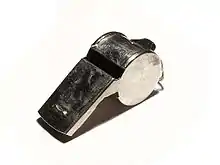whistle
English

A whistle (1)
Etymology
From Middle English whistlen, from Old English hwistlan, hwistlian (“to whistle”), from Proto-Germanic *hwistlōną (“to make a hissing sound”). Cognate with Icelandic hvísla (“to whisper”), Russian свистеть (svistetʹ, “to whistle”).
Pronunciation
Noun
whistle (countable and uncountable, plural whistles)
- A device designed to be placed in the mouth and blown, or driven by steam or some other mechanism, to make a whistling sound.
- An act of whistling.
- A shrill, high-pitched sound made by whistling.
- 1898, Winston Churchill, chapter 5, in The Celebrity:
- We expressed our readiness, and in ten minutes were in the station wagon, rolling rapidly down the long drive, for it was then after nine. […] As we reached the lodge we heard the whistle, and we backed up against one side of the platform as the train pulled up at the other.
- Any high-pitched sound similar to the sound made by whistling.
- the whistle of the wind in the trees
- (Cockney rhyming slang) A suit (from whistle and flute).
- 2005, Wally Payne, A Minority of One: A Monkey's Tale Continued
- We soldiers changed into our No.1 dress uniforms, Sid into his best whistle and we set off for the church.
- 2005, Wally Payne, A Minority of One: A Monkey's Tale Continued
- (colloquial) The mouth and throat; so called as being the organs of whistling.
- Walton
- Let's drink the other cup to wet our whistles.
- Walton
Derived terms
Terms derived from the noun whistle
Translations
device used to make a whistling sound
|
|
act of whistling
|
|
sound made by whistling
|
|
sound similar to the sound made by whistling
slang: a suit — see suit
- The translations below need to be checked and inserted above into the appropriate translation tables, removing any numbers. Numbers do not necessarily match those in definitions. See instructions at Wiktionary:Entry layout#Translations.
Verb
whistle (third-person singular simple present whistles, present participle whistling, simple past and past participle whistled)
- (transitive, intransitive) To make a shrill, high-pitched sound by forcing air through the mouth. To produce a whistling sound, restrictions to the flow of air are created using the teeth, tongue and lips.
- Never whistle at a funeral.
- She was whistling a happy tune.
- (transitive, intransitive) To make a similar sound by forcing air through a musical instrument or a pipe etc.
- The stream train whistled as it passed by.
- (intransitive) To move in such a way as to create a whistling sound.
- A bullet whistled past.
- (transitive) To send, signal, or call by a whistle.
- Addison
- He chanced to miss his dog; we stood still till he had whistled him up.
- Addison
Derived terms
Terms derived from the verb whistle
Translations
to produce a whistling sound
|
|
to move in such a way as to make a whistling sound
- The translations below need to be checked and inserted above into the appropriate translation tables, removing any numbers. Numbers do not necessarily match those in definitions. See instructions at Wiktionary:Entry layout#Translations.
Translations to be checked
|
Anagrams
This article is issued from Wiktionary. The text is licensed under Creative Commons - Attribution - Sharealike. Additional terms may apply for the media files.